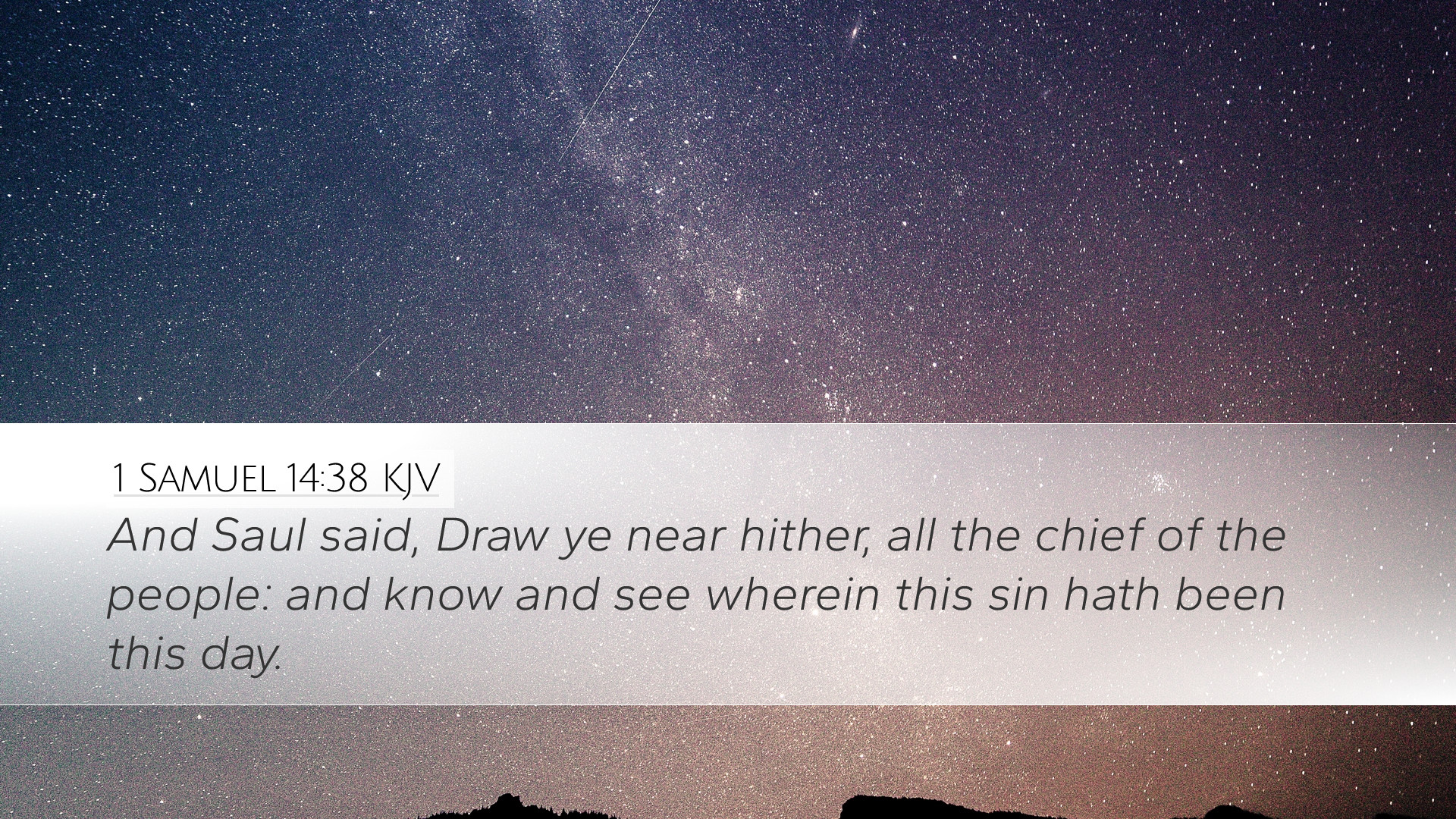Bible Commentary on 1 Samuel 14:38
Verse Context: 1 Samuel 14:38 reads, "And Saul said, 'Draw ye near hither, all the chief of the people: and know and see wherein this sin hath been this day.'” This verse reflects a critical moment following a troubling battle that reveals the spiritual state and leadership challenge facing King Saul.
Elucidation of the Verse
This verse highlights a significant process in which Saul seeks to divine the reason for recent failures—specifically, the defeat that befell Israel despite earlier victories. The chief of the people, likely including military leaders and priests, are called to identify the sin that had entered the camp.
Theological Insights
- Leadership Accountability: Saul's inquiry denotes the necessity of accountability among leaders. According to Matthew Henry, leaders must take spiritual and moral responsibility for the people they guide.
- Divine Revelation: Adam Clarke emphasizes the importance of seeking God's direction when facing uncertainty and strife. Saul’s call serves as an acknowledgment that understanding and guidance come from divine revelation.
- The Nature of Sin: Albert Barnes notes that sin has collective consequences and often manifests in the community's failure. Saul’s focus on sin reflects the belief that personal actions can impact communal prosperity.
Commentary Highlights
Matthew Henry: In his commentary, Henry suggests that Saul’s recognition of a divine cause behind their troubles is crucial; it reflects a shift toward a more serious consideration of the underlying spiritual reality among the Israelites. Henry interprets "the chief of the people" as those who should be spiritually attuned, suggesting that leaders must not only lead militarily but also in a manner that is respectful to God’s commands.
Albert Barnes: Barnes discusses how Saul's determination to uncover sin underscores both the seriousness of their plight and the belief that it can be correlated to divine displeasure. He articulates that Saul’s move can be seen as an attempt to restore favor with God in the eyes of a nation that wavered in faith.
Adam Clarke: Clarke points out that calling the elders and leaders together indicates the significance of collective wisdom in spiritual matters. He further suggests that sustained failure leads a leader to introspect, identifying sin as a barrier to communal success. Clarke brings attention to this moment as a teachable instance for both leaders and congregants on the importance of self-examination.
Implications for Leadership Today
- Spiritual Discernment: Modern leaders can learn the value of seeking divine wisdom and guidance in decision-making processes. Just as Saul looked for understanding, contemporary leaders should engage in prayerful consideration.
- Community Reflection on Sin: There’s a need for churches to collectively address sin issues, much like Saul gathered his leaders. Church leaders are encouraged to create environments where congregants can examine their conduct in the light of scripture.
- Restoration and Redemption: The role of repentance must be emphasized when addressing corporate sin, reflecting Saul's desire to understand and make right the relationship with God.
Conclusion
In 1 Samuel 14:38, we witness a moment of introspection for King Saul and the leadership of Israel. This call for reflection serves as a poignant reminder that spiritual leadership involves an earnest look at the state of both the individual and the community regarding sin. The insights from Matthew Henry, Albert Barnes, and Adam Clarke present a rich tapestry of understanding that both pastors and scholars can draw from when considering the corresponding spiritual principles. Leaders today must hold themselves and their communities accountable, foster environments of repentance, and seek divine insight to navigate the trials faced by the church and society.


